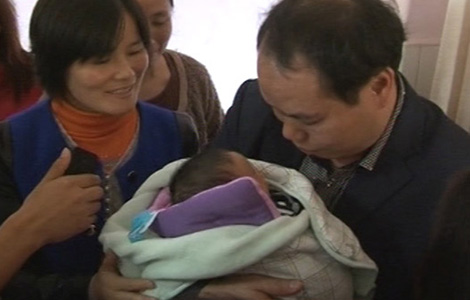China's reforms at critical point - scholar
Updated: 2013-11-11 20:55
(Xinhua)
|
|||||||||||
BEIJING - Substantial economic, social and governance reforms are needed in China to reduce the country's risks and avoid potential crises, a Chinese scholar has said.
In an exclusive interview with Xinhua, Chi Fulin, president of Haikou-based China Institute for Reform and Development, stressed important reform breakthroughs will bring the country sustainable growth in the next 10 to 20 years. Otherwise, increasing economic and social risks would become the biggest obstacle for the world's second largest economy.
"Reforms have become the key to release the future development prospects of China," he said.
The Third Plenary Session of the 18th CPC Central Committee started Saturday and ends Tuesday. The meeting will deliberate on a draft decision of the CPC Central Committee on "major issues concerning comprehensively deepening reforms."
"The economic reforms should focus on clarifying the relationship between the government and the market to stimulate market vitality," Chi said. "We should shift our pursuit from gross domestic product (GDP) growth in the past to fair and sustainable development."
Any delay could worsen current economic and social risks, warned the scholar.
He pointed out both economic and social reforms rely on the transformation of government functions, which should play an effective role in the market-oriented economy.
"The transformation should focus more on providing public services," Chi said.
Since the historic Third Plenary Session of the 11th CPC Central Committee launched the reform and opening-up drive in 1978, third plenary sessions have taken reform and opening up as their major agenda.
The biggest achievements of the country's reform over the past 35 years have been solutions to the needs of the country's huge population.
"Nowadays, people want better education, health care, jobs and good consumption and an improved environment," he said.
"People enjoy meat in their bowls, but they still complain when they put down their chopsticks. If the government fails to cope with their need of better public goods and services, the economic, social and governance transformations will all be undermined," Chi pointed out.
"The transformations must be in accordance with social needs," the scholar said. "China has a huge 'gold mine'. How can we dig out the gold? By reforms," the researcher affirmed.
Calls for reforms of the household registration system and land system have been widely echoed among the Chinese public.
According to Chi, the current system is a barrier to the country's further progress.
The "hukou" or household registration system is tied to one's place of residence and is used to obtain access to basic welfare and public services. The system prevents millions of migrant workers from gaining equal access to services in cities.
In the course of the country's industrialization and urbanization, some 260 million farmers have moved to cities to seek jobs. Their contracted farmland has been left to their parents, rented to others, or used by governments for construction.
Urbanization is regarded as an important force to expand domestic demand while the "hukou" reform should be an important step, said Chi.
Also, reform of the land system is a key issue in rural areas. Chi pointed out that the farmland contract system also needs reforming.
Furthermore, Chi underscored the urgency to tackle the vested interests of certain groups, who oppose further reforms.
Chi added that China's efforts to expand domestic demand and the urbanization of its population in the next five to 10 years will benefit the world.
"China's domestic demand will be a crucial force in re-balancing the global economy," Chi said. "China will play a more vital role in the sustainable growth of the world economy."
Related Stories
China administrative system reform enters 'deep water' 2013-11-11 09:34
SOE reforms to be launched after plenum 2013-11-11 07:29
China's deepening reform catches world attention 2013-11-10 16:11
Historic CPC session begins to set reform agenda 2013-11-10 07:57
Today's Top News
China, India, Russia seek co-op on int'l issues
Man attacks 2 foreign students with hammer
Vaccine switch to prevent paralysis
Suspect arrested in 3 children's murder
SOE reforms to be launched after plenum
'Singles Day' to see big spenders
Launch zone challenges
European satellite continues fall to Earth
Hot Topics
Lunar probe , China growth forecasts, Emission rules get tougher, China seen through 'colored lens', International board,
Editor's Picks

|

|

|

|

|

|





